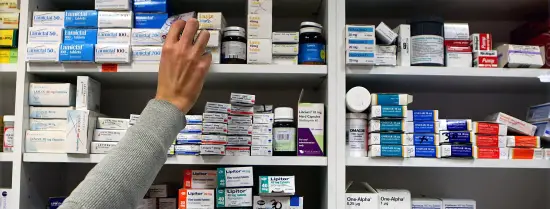
In many countries, patients have to wait a long time before expensive medicine become available, reducing their chance of survival. This is unfair and has to change, says professor of Health Technology Assessment Carin Uyl-de Groot at Erasmus School of Health Policy & Management. "The common thread in my research is making medicines available faster and more cheaply."
Why does it often take a long time before medicine become available?
"When an approved medicine enters the market, the manufacturer has to register it separately in each country. This often involves submitting a pharmacoeconomic dossier that includes, for example, information on the medicine’s cost-effectiveness. Pharmaceutical companies often do this first in large markets such as Germany and France. Countries will then negotiate the price per treatment with the manufacturer. In the Netherlands, this process is increasingly slow and takes five hundred days on average. Negotiations sometimes get bogged down, and as a result the medicine doesn’t get reimbursed at all."

What do you make of that?
"I think it’s unfair. Medicine are a necessity, not a luxury item. People should get the best treatment available, no matter where they live. There are currently a number of medicines in the Netherlands with proven added value that are not reimbursed in view of the cost-effectiveness. One of these is a breast cancer drug that increases patients’ lifespan by about six months on average."
How expensive are medicine allowed to be?
"In The Netherlands we’ve agreed that treatment is allowed to cost about 80,000 euros per life year gained and lived with a good quality of life. A medicine has to have added value compared to existing treatments, and the side effects must be proportional. The impact of the medicine on overall healthcare costs also makes a difference. A new cancer drug costs between €80,000 and €100,000 per patient. A medicine for a very rare disease affecting only a handful of patients usually has a lower budgetary impact than a common medicine for, say, breast cancer."
Those are huge sums of money. Is there no way to bring the cost down?
"Manufacturers put a lot of money into medicine development. Even so, the prices are often disproportionate to the costs incurred. In the case of new medicines, there is usually a monopoly and it’s unclear how the prices are set. In the ASCERTAIN project, we work on ways to calculate a fair price. I’m not against manufacturers turning a smart profit from medicines, but this shouldn’t happen at the expense of accessibility."
What else are you doing to increase the accessibility of medicine?
"For one, the project is looking at a pay-for-performance model where the manufacturer gets paid more if a treatment is successful. We’re also working on a tool where data for different medicines can be entered per country. Each country has a different healthcare budget, and this way you can get a quick idea of the cost-effectiveness and budgetary impact. To give you an idea: about 250 medicines are currently in the pipeline and will be registered in the coming period. If admission to the market can be sped up following registration, this can extend people’s lives. It’s also a win for manufacturers: after all, they miss out on turnover as long as they cannot deliver their medicine."

- Professor
- More information
The ASCERTAIN project is a European research initiative aimed at the accessibility and affordability of essential cancer drugs. The project brings together experts from different fields such as medicine, pharmacology, economics and health policy in order to help policymakers make informed decisions on the reimbursement of medication.
- Related content
